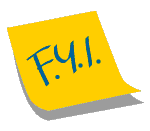CLASS SCHEDULE
|
| DATES |
TOPICS |
READINGS |
ASSIGNMENTS |
1.
May 23 |
General concepts
Problem solving: Understand and define the problem.
Algorithmic solutions. Heuristic solutions. Data types
|
SPRANKLE: Chapters 1-2
JAVA: Chapters 1-2 |
Obtain what you need: PC, browser, CAPS account #,
books w/CD-ROMs;
Write your first Java program using instructions in book |
2.
May 30 |
Review first assignment
Programming concepts
Java basics; debugging
simple programs
|
SPRANKLE: Chapter 3
JAVA: Chapter 3
|
E-mail me to say hello. (If you can't succeed, then phone me!)
Continue Java programming on your own.
|
3.
June 6 |
Program development cycle. Programming environments.
Structured programming: logical structures;
sequences; decisions (branches)
|
SPRANKLE: Chapters 4-5
JAVA: Chapters 4-5
|
JAVA p. 112 problem 8 (LCM).
E-mail me your ASCII code.
|
4.
June 13 |
More decisions; loops. REVIEW SESSION
|
SPRANKLE: Chapter 6
|
Selected JAVA programming exercises in book
|
5.
June 20 |
QUIZ #1.
More loops; case logic
|
SPRANKLE: Chapters 7-8
JAVA: Chapter 6
| Continue JAVA programming exercises in book
|
6.
June 27 |
More operators & math functions
Control statements
|
JAVA: Chapters 6-7
|
PROGRAMMING ASSIGNMENT: For any number specified by the
user, test whether or not it is prime. Details in class.
|
7.
July 4 |
NO CLASS this week
|
Continue working on your Prime number program.
Help on this assignment is available by e-mail.
|
8.
July 11 |
Object-oriented programming concepts:
objects, methods, etc. |
SPRANKLE: Chapters 11-12
JAVA: Chapters 8, 10
|
|
9.
July 18 |
QUIZ #2
Arrays; strings
|
SPRANKLE: Chapter 9
JAVA: Chapter 9
| Selected JAVA programming exercises in book
|
10.
July 25 |
Recursion; graphics; complexity analysis;
program testing & documentation
|
JAVA: Chapters 11-12
|
|
11.
Aug. 1 |
Data structures, incl. vectors, tables, & lists
|
SPRANKLE: Ch. 10
JAVA: Chapters 14-15
| Continue JAVA program-
ming exercises in book
|
12.
Aug. 8 |
Files and file processing
|
SPRANKLE: Chapters 13-15
JAVA: Chapter 13
|
|
13.
Aug. 15 |
HTML and applets
|
JAVA: Chapters 16-17
Implement a Java applet of your choice on your web page.
When it's finished, send me e-mail giving me the URL.
(Applets will be graded, in part, on the basis of their
sophistication and complexity. Applets that do not work
will receive grades of zero.)
|
14.
Aug. 22 |
REVIEW SESSION
|
Work on your applets. Final versions must be posted
to your web site before midnight Friday, August 24.
|
- Grading, Deadlines, and Make-ups
- Your grade will be based on a series of assignments, many of which
will result in a document or page that you should post to your
own web site. Assignments are expected to be completed on time,
and most can be submitted over the Web even if you cannot come to class.
Normally, projects or assignments turned in late will automatically
be reduced by one letter grade, unless there is a very compelling reason
for the tardiness. If you miss any assignments or scheduled deadlines,
be sure to talk to me (or E-mail me) as soon as possible.
- Attendance
- Attendance is not required but is highly recommended.
In addition to class attendance, this course requires considerable
student work outside of class. Students who put in little effort are
almost assured of a poor (possibly failing) grade in the course.
- Cheating and Plagiarism
- Although working collaboratively is encouraged, any work that
you turn in should be yours and yours alone. Cheating and/or
plagiarism will result in a failing grade.
|







 Hi, I'm
Eli Minkoff, course instructor. I teach full-time at
Hi, I'm
Eli Minkoff, course instructor. I teach full-time at